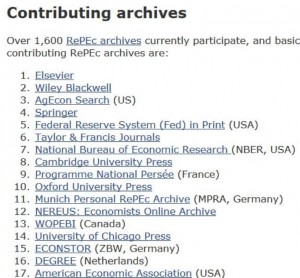Posted: January 6th, 2017 | Author: Olaf Siegert | Filed under: Newspost | Tags: rankings, RePEc | Comments Off on Recommendations for RePec ranking optimization
In one it’s recent posts, the RePEc team has released some recommendations for Authors and Institutions to make better use of their ranking positions. As RePEc rankings are increasingly popular among the Econonomics research community, this seems to be very good approach. Compared to other rankings RePEc is quite transparent about the methods used to compile it’s charts.
Posted: June 26th, 2014 | Author: Olaf Siegert | Filed under: Newspost | Tags: Downloads, rankings, RePEc | Comments Off on EconStor now in RePec TOP 10
Latest statistics sees EconStor among the ten most heavily used archives in RePec
Most Economists know, that RePEc publishes rankings on publications, authors and research institutions. Less known is the fact, that RePec also provides statistics on it’s contributing archives and how they perform. These archives can come from university faculties (e.g. for their working papers), from publishers (for their journals) or from repositories (either institutional or subject based).  A ranking of the largest archives is provided on the RePEc homepage (see also screenshot on the right).
A ranking of the largest archives is provided on the RePEc homepage (see also screenshot on the right).
As a subject repository with a focus on the German Economics community EconStor provides it’s RePEc input services for over 100 institutions, which places as amont the TOP 20 archives with respect to size.
But even more pleasant (and also more important to our customers) is the fact, that papers on EconStor are also heavily used. Looking at the detailed LogEc statistics for all contributing archives in RePEc, we find that EconStor (acronym “zbw”) is at number 10 concerning the use of our archives (number of downloads).
Posted: April 29th, 2013 | Author: Olaf Siegert | Filed under: Newspost | Tags: citation analysis, RePEc, Social media | Comments Off on Social Media references as data for RePEc rankings? Network starts Online Voting
 Citation analysis in RePEc is very popular among Economists worldwide. So far it is mainly based on citations in reference lists of Journal Articles and Working Papers. But as Social Media are more and more used not only for academic networking, but also for scholarly discussions, an extended impact analysis is up for discussion.
Citation analysis in RePEc is very popular among Economists worldwide. So far it is mainly based on citations in reference lists of Journal Articles and Working Papers. But as Social Media are more and more used not only for academic networking, but also for scholarly discussions, an extended impact analysis is up for discussion.
In his latest Blog Entry RePEc member Christian Zimmermann proposes some extensions to the existing RePEc rankings, e.g. the inclusion of Wikipedia or Economics Blogs. In order to get a better understanding of the Community View, Zimmermann started an Online Voting. The results are open for everyone and show so far, that there’s a split within Economists, with one part being open for the inclusion of Social Media for citation analysis, while others are very sceptical.
This shows, that there’s definitely some change going on the scholarly publication landscape in Economics, but so far Social Media are still controversial, when it comes to quality assessment of research papers. Nevertheless there are tools like Altmetrics, who show, that impact analysis goes beyond journal impact factors. And even large research organisations like the Leibniz Association in Germany with it’s research network “Science 2.o” have started to analyse how Social Media are affecting scholarly communication.
Posted: April 16th, 2012 | Author: Olaf Siegert | Filed under: Newspost | Tags: Economics, Economists Online, Open Access, RePEc, Repository, SSRN | Comments Off on The World Bank starts its own Open Access repository
More than 2,000 books, articles, reports and research papers available
 The World Bank last week launched its Open Knowledge Repository, which is a one-stop-shop for most of the Bank’s research outputs and knowledge products, providing free and unrestricted access. Additional material, including foreign language editions and links to datasets, will be added in the coming year.
The World Bank last week launched its Open Knowledge Repository, which is a one-stop-shop for most of the Bank’s research outputs and knowledge products, providing free and unrestricted access. Additional material, including foreign language editions and links to datasets, will be added in the coming year.
The repository uses a dissemation strategy similar to Econstor, which means that their publications are also visible in
“major international repositories (and databases) such as RePEc (Research Papers in Economics), SSRN and Economists Online. This means that the World Bank publishes just once in its own Open Knowledge Repository while its research is also “harvested” and made openly available through many other searchable online repositories, increasing the number of people able to find World Bank content.”
On top of that, the World Bank also tries to negotiate an Open Access friendly environment for future publications of their researchers:
“The Bank is working with journal publishers to determine fair embargo periods after which peer-reviewed journal articles, as accepted for publication, will be added to the repository. The working paper versions of journal articles are available in the Open Knowledge Repository under a Creative Commons attribution-only (CC BY) license without any embargo period.
World Bank Publisher Carlos Rossel expects embargo periods on journal articles to shorten as more organizations opt for open access and the academic publishing industry adapts to the Internet age. “The changes have been tremendous already, but I think there is a groundswell that is saying that frankly part of the value added by journal publishers can be accomplished through other means, and really what’s most important is for our knowledge to be readily accessible,” he said.”
Read the full press release here
Posted: February 13th, 2012 | Author: Olaf Siegert | Filed under: Monthly Report | Tags: EconBiz, Open Access, RePEc | 1 Comment »
The Economics portal EconBiz (operated by the ZBW) has r eleased a new tool called EconBizOpen. It’s an Open Access database for Economics and Business Studies and includes more than 800.000 full-text articles, which are accessible for free on the web.
eleased a new tool called EconBizOpen. It’s an Open Access database for Economics and Business Studies and includes more than 800.000 full-text articles, which are accessible for free on the web.
 Major input sources for EconBizOpen are RePec and BASE. BASE (maintained by Bielefeld Universiy Library) is one of the world’s most voluminous search engines dedicated to academic open access material. Its papers from Business and Economics are now also part of EconBizOpen.
Major input sources for EconBizOpen are RePec and BASE. BASE (maintained by Bielefeld Universiy Library) is one of the world’s most voluminous search engines dedicated to academic open access material. Its papers from Business and Economics are now also part of EconBizOpen.
Posted: January 23rd, 2012 | Author: Olaf Siegert | Filed under: Monthly Report | Tags: Open Access, RePEc, Repositories | Comments Off on Final Report of PEER analyses current publication process
The EU-funded project PEER (Publishing and the Ecology of European Research) analyses the scholarly publication process with a focus the impact of repositories on journal publishing.
The final report, which is now available (http://www.peerproject.eu/reports/) states the importance of the right publication strategy:
“Today, the distinctions between the three [scholarly research publication] models (subscription based, OA or repositories) are blurred, although it is becoming clear that the success of OA journals and repositories – as is the case for subscription based journals – depends on the strategies of individual players, and not merely OA status. The success of BioMed Central and PLoS proves that OA status does not equate in principle to lower quality of research as was suggested initially by some concerned authors. At the same time, OA status does not in itself automatically lead to higher citation and visibility for the authors. In the case of repositories, while some (such as REPEC and ArXiv) succeeded in becoming a starting point and not just a destination in scholarly search (i.e. a site actively searched for and not referred to via a keyword based search), many other repositories are less visible.”
Posted: November 28th, 2011 | Author: Olaf Siegert | Filed under: Monthly Report | Tags: articles, Economics, journals, RePEc, working papers | Comments Off on Working Papers on RePEc are much more used than Journal Articles
RePEc, one of EconStor’s strong partners in disseminating and showcasing research output in Economics has released new figures on the usage of it’s papers. In their latest blog entry they say:
While a majority [of the papers] are from journals (61%), online working papers are much more popular. While an article is download on average once every two months, working papers are downloaded close to once a month.
http://blog.repec.org/2011/11/26/1-million-works-available-online-through-repec/
Posted: November 25th, 2011 | Author: Olaf Siegert | Filed under: Monthly Report | Tags: citation analysis, EconBiz, Economics, Economists Online, EconStor, Google, journal articles, Open Access, rankings, RePEc, Verein für Socialpolitik, working papers, ZBW | Comments Off on EconStor is now among the TOP20 RePEc archives
Increased visibility for German research publications in Economics
 RePEc (Research Papers in Economics) is the most important database for publications in economics, currently holding more than one million bibliographic records. Many of the documents are in Open Access and therefore freely accessible on the internet. The RePEc database has a worldwide scope and offers researchers and institutions relevant functions such as citation analysis, alerting services and rankings to measure their research output and its impact. Renowned academic publishers such as Elsevier, Blackwell-Wiley and Springer also use the database as a multiplier for their journals. Moreover, RePEc is the largest scholars’ network in its field with more than 30,000 registered economic researchers.
RePEc (Research Papers in Economics) is the most important database for publications in economics, currently holding more than one million bibliographic records. Many of the documents are in Open Access and therefore freely accessible on the internet. The RePEc database has a worldwide scope and offers researchers and institutions relevant functions such as citation analysis, alerting services and rankings to measure their research output and its impact. Renowned academic publishers such as Elsevier, Blackwell-Wiley and Springer also use the database as a multiplier for their journals. Moreover, RePEc is the largest scholars’ network in its field with more than 30,000 registered economic researchers.
As a national service institution for RePEc, the Open Access publication server EconStor organises the publication records for nearly one hundred German institutions and advises them and their researchers on the optimal use of RePEc. This service is free of charge and includes not only the uploads of publications but also the provision and processing of the title data such as abstracts, author keywords and classifications. Based on publication agreements with the institutions, publications are permanently archived on EconStor and made available in Open Access. Documents are searchable not only in RePEc, but also in Google and other economic portals such as EconBiz and Economists Online.
Publications from economics faculties at universities, but also from research institutes of the Leibniz Association, the Max Planck Society, the Fraunhofer-Gesellschaft, the Helmholtz Association and the German research association Verein für Socialpolitik add up to more than 32,000 titles in EconStor. Among these publications are working and discussion papers, journal articles and conference contributions. The RePEc service of EconStor was initially funded by the German Research Foundation (DFG) and is now sustainably maintained by a team of ZBW experts.
 A ranking of the largest archives is provided on the
A ranking of the largest archives is provided on the 



 Subscribe to RSS
Subscribe to RSS


